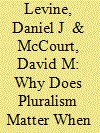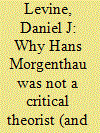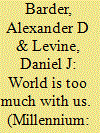|
|
|
Sort Order |
|
|
|
Items / Page
|
|
|
|
|
|
|
| Srl | Item |
| 1 |
ID:
145984


|
|
|
|
|
| Summary/Abstract |
Planet Politics is about rewriting and rethinking International Relations as a set of practices, both intellectual and organisational. We use the polemical and rhetorical format of the political manifesto to open a space for inter-disciplinary growth and debate, and for thinking about legal and institutional reform. We hope to begin a dialogue about both the limits of IR, and of its possibilities for forming alliances and fostering interdisciplinarity that can draw upon climate science, the environmental humanities, and progressive international law to respond to changes wrought by the Anthropocene and a changing climate.
|
|
|
|
|
|
|
|
|
|
|
|
|
|
|
|
| 2 |
ID:
159482


|
|
|
|
|
| Summary/Abstract |
Pluralism has become a buzzword in International Relations. It has emerged in a number of linked literatures and has drawn the support of an unusual coalition of scholars: advocates of greater methodological diversity; those who feel that IR has degenerated into a clash of paradigmatic “-isms”; those who favor a closer relationship between academics and policy-makers; and those who wish to see greater reflexivity within the field. Perhaps unsurprisingly, no single vision of pluralism unites these scholars; they appear to be using the term in divergent ways. Accordingly, our aim is threefold. First, we wish to highlight this odd state of affairs, by placing it in disciplinary and intellectual context. Second, we distinguish between plurality—the de facto recognition that IR has become a more diverse field—and pluralism—a normative position which values that diversity, given the public vocation of social science. Finally, we lay out a more consistent understanding and defense of pluralism in those latter terms. We argue that, properly understood, pluralism entails a position of epistemological skepticism: the straightforward claim that no single knowledge system, discipline, theory, or method can claim singular access to truth.
|
|
|
|
|
|
|
|
|
|
|
|
|
|
|
|
| 3 |
ID:
121855


|
|
|
|
|
| Publication |
2013.
|
| Summary/Abstract |
A growing body of critical and reflexive international relations (IR) realism draws on the work of Hans Morgenthau. While not without merit, I argue that these appropriations rely on selective - perhaps even wishful - readings of Morgenthau's work: the reflexivity that he calls for, I argue, is not matched by what his theory actually delivers. Raising that distinction, I then trace out its consequences for contemporary critical and reflexive IR realists, in two steps. First, I identify similar reflexive shortcomings in recent work by neoclassical realist Randall Schweller. These, I suggest, point to abiding challenges to which contemporary critical/reflexive realism must prove itself equal. I then survey the notions of reflexivity at work in the critical/reflexive realism of Michael C. Williams and Richard Ned Lebow. Do they go far enough? Do they answer those challenges? I conclude by arguing that Morgenthau's legacy for critical and reflexive realism should be reconsidered: properly understood, his work signals an impasse that is general to IR as a discipline. Signaling the depth of that impasse constitutes a lasting legacy, with which critical/reflexive realists have not yet dealt adequately.
|
|
|
|
|
|
|
|
|
|
|
|
|
|
|
|
| 4 |
ID:
113854


|
|
|
|
|
| Publication |
2012.
|
| Summary/Abstract |
International Relations' constructivist turn - that body of approaches emerging in the late 1980s/early 1990s in which international outcomes were held to be predicated upon complex social arrangements, rules, norms, institutions, language and culture - emerged from a unique historical and intellectual moment. Initially, this theoretical turn was deeply committed to reflexivity and circumspection: since events were held to be contingent and theorists were bound up in them, the obligation to sustained critical self-reflection was central to the project. That commitment would not last, however. By the mid-1990s, it had given way to a 'middle ground' (or via media) position, which aligned itself with dominant materialist and rationalist methodologies and epistemologies. We wish to examine that moment of realignment: how it happened, and what it might mean. We argue that having imbibed a degree of the free-floating optimism that was 'in the air' in the 1990s, via media constructivism's leading scholars came to believe that it was no longer necessary to problematise the historicity and contingency of their own historical moment and philosophical horizons. The post-Cold War 'world', we hold - or, at any rate, one account of it - was 'too much with' via media constructivism: selectively constraining its reflexive impulses and critical tools in ways that, however unintentionally, provided cover for particular normative and ideological configurations. To move past this, we argue that via media constructivists need a sustainably critical ethos: one which 'repoliticises' international theory by unmasking its hidden ideological and political starting points.
|
|
|
|
|
|
|
|
|
|
|
|
|
|
|
|
|
|
|
|
|